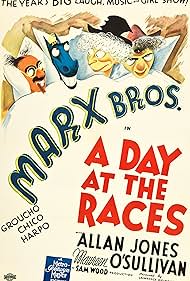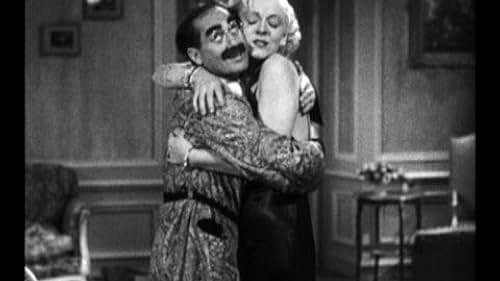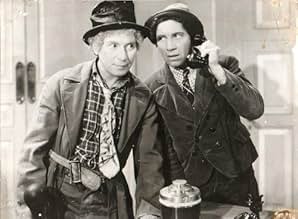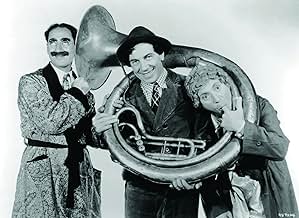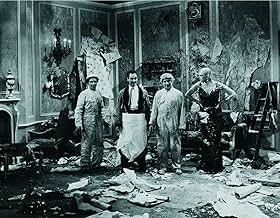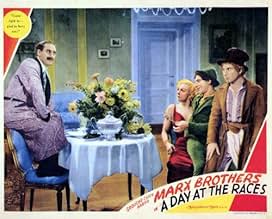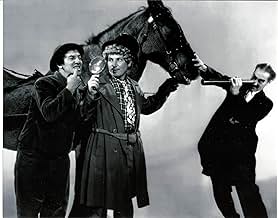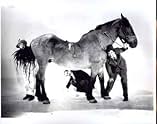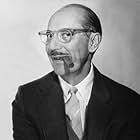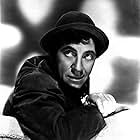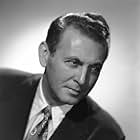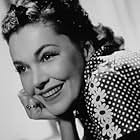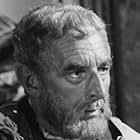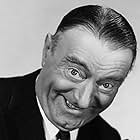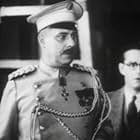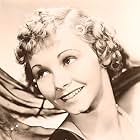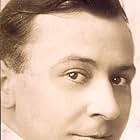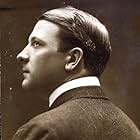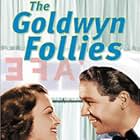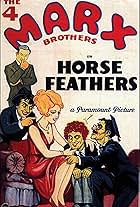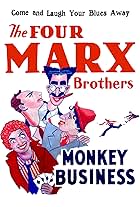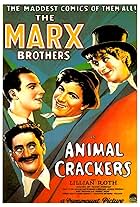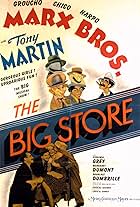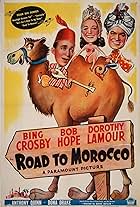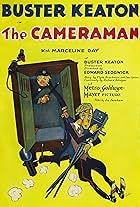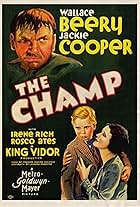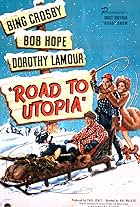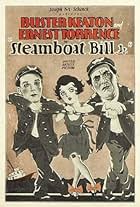A veterinarian posing as a doctor teams with a singer and his friends as they struggle to save an upstate New York sanitarium with the help of a misfit racehorse.A veterinarian posing as a doctor teams with a singer and his friends as they struggle to save an upstate New York sanitarium with the help of a misfit racehorse.A veterinarian posing as a doctor teams with a singer and his friends as they struggle to save an upstate New York sanitarium with the help of a misfit racehorse.
- Nominated for 1 Oscar
- 1 nomination total
Groucho Marx
- Dr. Hugo Z. Hackenbush
- (as The Marx Brothers)
Chico Marx
- Tony
- (as The Marx Brothers)
Harpo Marx
- Stuffy
- (as The Marx Brothers)
Sig Ruman
- Dr. Steinberg
- (as Sig Rumann)
Hooper Atchley
- Race Judge
- (uncredited)
King Baggot
- Race Track Official Starter
- (uncredited)
Kenny Baker
- Party Guest
- (uncredited)
Vivian Barry
- Telephone Girl
- (uncredited)
Storyline
Did you know
- TriviaWith a running time of one hour and 50 minutes, this is the longest of The Marx Brothers' theatrical films.
- GoofsWhen Stuffy gets on the horse with the wagon, he is wearing a coat and dark trousers. As jockey he wears white pants and jockey shirt. While he could have lost the coat easy enough, there was no opportunity for him to change pants.
- Quotes
[Stuffy has grabbed some poison to drink]
Dr. Hackenbush: Hey, don't drink that poison! That's $4.00 an ounce!
- Alternate versionsAfter the film's opening two musical numbers featuring the songs "I'm Dr. Hackenbush" and "I've got a message from the man in the moon" were removed. This footage is now believed to have been destroyed.
- ConnectionsEdited into Hollywood: The Dream Factory (1972)
- SoundtracksOn Blue Venetian Waters
(1937) (uncredited)
Music by Bronislau Kaper & Walter Jurmann
Lyrics by Gus Kahn
Sung by Allan Jones
Danced by Vivien Fay and an Ensemble of Girls
Featured review
Here's how I ended my review of "A Night at the Opera": "As good as it is, the film sets a precedent and provides the ludicrous idea that a Marx Brothers movie could be a vehicle for a banal romance, meant to promote two MGM stars. With a reasonable timing and good 'interludes', maybe, but who would believe the audience came to watch anyone but the Marx Brothers?" Well, I rest my case.
Titles don't lie, "A Day at the Races" was obviously meant as the spiritual successor of "A Night of the Opera" and confirmed their new departure in tone and 'gags-ratio' under the supervision of one of their most distinguished admirers, MGM producer Irvin Thalberg. But Thalberg died of pneumonia during production and the iconic siblings would never get the same consideration and even Groucho would lose interest in making films. The Marxes would make a few movies after "Races" but nowhere near the early 30's level, not that "Races" play in that league too.
So long gone were the bestial titles, the Pre-Code raunchy humor and the exhilarating deliverance of pure anarchical fun, the monkeying trolls became "good guys" helping the romantic lead to achieve their dreams and prevent the bad guys from spoiling them. While the formula worked with "A Night of the Opera", "A Day at the Races" made me feel that the previous success was accidental or maybe the opera-setting gave the film a certain edge, or maybe the Paramount spirit was still there or maybe it was just new and kind of interesting. Like Thalberg said "half the laughs and twice the money".
But even "Opera" didn't match that equation, I counted twenty minutes of sappiness out of ninety minutes of fun, "A Day in the Races" is filled with with so many needlessly stretched musical and romantic moments that the whole experience gets excruciating. Allen Jones reprises his romantic role, Maureen O'Sullivan is the new 'Jane' and the villain is the same from "Opera". Whenever the screen is filled with characters who are not Marxes, I was groaning. It's one thing to be supportive characters... but supporting? Can you imagine the same situation in a Buster Keaton or a Chaplin film?
Naturally, when they are brought up together on screen, the film gets on its tracks and provides some unforgettable moments, like the extended "Tootsie-Fruitsy" scene between Groucho and Chico, Harpo's charade, the climactic race with Hi-Hat the horse and the whole mayhem in the hospital which is perhaps one of the most defining of the 'Marxian' power, even Margaret Dumont is hilarious in this. Speaking of the fifth 'Brother', she's never been as flirtatious with Groucho as in her hypochondriac socialite's role and you could tell there was some genuine chemistry growing between the two.
Groucho Marx was at the top of his game as horse veterinarian passing for legitimate doctor Hackenbush, and there's nothing to say about Chico as usual delightfully ethnic and Harpo for once had a pivotal role in the film. But all the good stuff of the film, and there was some, was diluted into an ocean of cuteness and schmaltz making the cocktail as tasty. I can't say I liked every early Marx Brother but at least "Monkey Business" which wasn't even their best had a running time shorter than eighty minutes. "A Day at the Races" for one thing has a lying title as it runs for almost two hours and features scenes that have nothing whatsoever with the racing. It feels more like "A Day at Disneyland" where you get the equivalent of twenty minutes of fun for four hours of waiting in queues.
These fillers in "Races" felt like endless queues, the musical numbers with African-American people and the one on-stage were marvelously choreographed but they're not exactly what everyone's looking forward to seeing in a Marx Brothers film. Don't get me wrong, "A Day at the Races" had all the makings of a good Marx Brothers film but all the dullness of a forgettable chick flick... except for the ending which is perhaps the final hurrah of the Marx brothers making their last "classic" and leave with you a little smile in your face. And don't get this criticism wrong, it all comes from a fan.
Actually, I believe the Marx brothers were big, maybe too big for the big screen. They made their bones on stage, in vaudeville acts and are mostly remembered for sketches such as the "mirror dance", the "crowded cabin cruise", comedic routines involving contract parties, swordfishes or pantomime numbers provided by Harpo 'Honk Honk' Marx. In other words, they were the Monty Python and Saturday Night Live of their generation and it's no surprise that Groucho Marx had a revival of career during the Golden Age of TV. My feeling is that the Marxes would have made terrific TV entertainers in their prime, they were just at the peak of their popularity at the wrong moment, during Hollywood Golden Age and MGM and Marx Brothers mix exactly like Margharita and sugar.
But like Monty Python, the Marxes could make a few great movies, mostly satirical, a classic like "Duck Soup", "Animal Crackers", "Horse Feathers" and "Opera", sometimes, it doesn't take more than three classics to leave a legacy, the Marxes had half a dozen. "A Day at the Races" is still good enough for its time, but not so good for hardcore fans.
Titles don't lie, "A Day at the Races" was obviously meant as the spiritual successor of "A Night of the Opera" and confirmed their new departure in tone and 'gags-ratio' under the supervision of one of their most distinguished admirers, MGM producer Irvin Thalberg. But Thalberg died of pneumonia during production and the iconic siblings would never get the same consideration and even Groucho would lose interest in making films. The Marxes would make a few movies after "Races" but nowhere near the early 30's level, not that "Races" play in that league too.
So long gone were the bestial titles, the Pre-Code raunchy humor and the exhilarating deliverance of pure anarchical fun, the monkeying trolls became "good guys" helping the romantic lead to achieve their dreams and prevent the bad guys from spoiling them. While the formula worked with "A Night of the Opera", "A Day at the Races" made me feel that the previous success was accidental or maybe the opera-setting gave the film a certain edge, or maybe the Paramount spirit was still there or maybe it was just new and kind of interesting. Like Thalberg said "half the laughs and twice the money".
But even "Opera" didn't match that equation, I counted twenty minutes of sappiness out of ninety minutes of fun, "A Day in the Races" is filled with with so many needlessly stretched musical and romantic moments that the whole experience gets excruciating. Allen Jones reprises his romantic role, Maureen O'Sullivan is the new 'Jane' and the villain is the same from "Opera". Whenever the screen is filled with characters who are not Marxes, I was groaning. It's one thing to be supportive characters... but supporting? Can you imagine the same situation in a Buster Keaton or a Chaplin film?
Naturally, when they are brought up together on screen, the film gets on its tracks and provides some unforgettable moments, like the extended "Tootsie-Fruitsy" scene between Groucho and Chico, Harpo's charade, the climactic race with Hi-Hat the horse and the whole mayhem in the hospital which is perhaps one of the most defining of the 'Marxian' power, even Margaret Dumont is hilarious in this. Speaking of the fifth 'Brother', she's never been as flirtatious with Groucho as in her hypochondriac socialite's role and you could tell there was some genuine chemistry growing between the two.
Groucho Marx was at the top of his game as horse veterinarian passing for legitimate doctor Hackenbush, and there's nothing to say about Chico as usual delightfully ethnic and Harpo for once had a pivotal role in the film. But all the good stuff of the film, and there was some, was diluted into an ocean of cuteness and schmaltz making the cocktail as tasty. I can't say I liked every early Marx Brother but at least "Monkey Business" which wasn't even their best had a running time shorter than eighty minutes. "A Day at the Races" for one thing has a lying title as it runs for almost two hours and features scenes that have nothing whatsoever with the racing. It feels more like "A Day at Disneyland" where you get the equivalent of twenty minutes of fun for four hours of waiting in queues.
These fillers in "Races" felt like endless queues, the musical numbers with African-American people and the one on-stage were marvelously choreographed but they're not exactly what everyone's looking forward to seeing in a Marx Brothers film. Don't get me wrong, "A Day at the Races" had all the makings of a good Marx Brothers film but all the dullness of a forgettable chick flick... except for the ending which is perhaps the final hurrah of the Marx brothers making their last "classic" and leave with you a little smile in your face. And don't get this criticism wrong, it all comes from a fan.
Actually, I believe the Marx brothers were big, maybe too big for the big screen. They made their bones on stage, in vaudeville acts and are mostly remembered for sketches such as the "mirror dance", the "crowded cabin cruise", comedic routines involving contract parties, swordfishes or pantomime numbers provided by Harpo 'Honk Honk' Marx. In other words, they were the Monty Python and Saturday Night Live of their generation and it's no surprise that Groucho Marx had a revival of career during the Golden Age of TV. My feeling is that the Marxes would have made terrific TV entertainers in their prime, they were just at the peak of their popularity at the wrong moment, during Hollywood Golden Age and MGM and Marx Brothers mix exactly like Margharita and sugar.
But like Monty Python, the Marxes could make a few great movies, mostly satirical, a classic like "Duck Soup", "Animal Crackers", "Horse Feathers" and "Opera", sometimes, it doesn't take more than three classics to leave a legacy, the Marxes had half a dozen. "A Day at the Races" is still good enough for its time, but not so good for hardcore fans.
- ElMaruecan82
- Oct 17, 2018
- Permalink
- How long is A Day at the Races?Powered by Alexa
Details
Box office
- Budget
- $2,016,000 (estimated)
- Runtime1 hour 51 minutes
- Color
- Aspect ratio
- 1.37 : 1
Contribute to this page
Suggest an edit or add missing content

